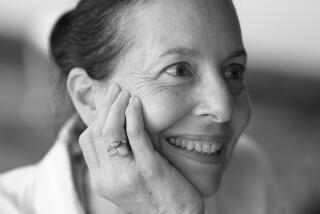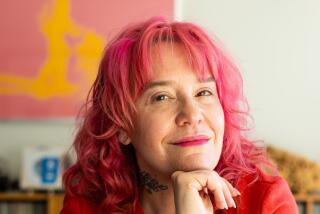Q&A: Mimi Lipson on her debut collection, ‘The Cloud of Unknowing’
On Friday night at Stories in Echo Park, Mimi Lipson will take the mike to read from her debut short story collection, “The Cloud of Unknowing,” published by the small independent Yeti Publishing. Lipson, who lives in Kingston, N.Y., put together the book tour herself and will be joined by her friend, the musician John Andrew Fredrick of the Black Watch, who will read from his novel “The King of Good Intentions.” Sigrid Nunez calls her a natural and Jenny Offill describes her writing as “dazzling offhand briliance.” The Friday reading begins at 7:30 p.m.; Lipson answered our questions by email.
The first story in your collection, “Lou Schultz,” features two kids on a trip to DisneyWorld with their father. His priorities seem sort of inverted, yet he’s a really sympathetic character. Was this based at all on your personal experience? And how did you find a way into the father’s perspective, rather than your own?
Lou Schultz was indeed inspired by my father. In its broad strokes and personality details, that story is maybe 72% factual. Or anyhow, it’s true enough to life that, when my sister read it, her response was: “I’m so glad someone is getting all this down.” But it is fiction, so really there isn’t a possible perspective in that story that I could say was “my own.”
I tried to write the story from various different points of view, but without access to Lou’s thoughts, his actions made him seem distractingly loutish--and that wasn’t what I wanted. I’m not sure how I found my way into his head. I guess that’s the part of writing that’s like acting, but I don’t have a lot of insight about how it happens. I do think the character had to diverge from his influence--to become more of my creation--so I could presume to speak for him. That is one part of how “stuff that happened” becomes fiction.
As a writer publishing your first book of fiction, what was the thing you were most anxious about?
Actually, I was very anxious about questions like the first one! I was worried that people would recognize details and then read my fiction as autobiography. But I guess I asked for it by not creating worlds out of whole cloth. That wasn’t the biggest anxiety, though. I’m a pretty modest person in some ways. Just putting a book into the world--and then promoting it, and expecting people to read it--that’s the kind of attention-seeking behavior I tend to avoid. That was probably the most stressful part.
Some Angelenos will recognize the bar in your story “The Searchlight” as the Blacklite, a now-closed dive bar on Western. What about that bar in particular interested you?
Oh, the Blacklite was wonderful! The scene belonged to the working ladies from Santa Monica Boulevard, but in my experience it was a pretty welcoming place where a lot of different demimondes collided. That’s always interesting to me. And it was cheap and unpretentious. No mixologists. When I used to go there, I was quite free of the kind of handwringing that’s in the story. I didn’t worry, as Kitty does, whether I was a tourist. That part is complete invention!
Incidentally, I learned about the Blacklite in sort of the way Kitty does. I was new in town, and I met the writer and performance artist Ron Athey at a party. I didn’t know who he was, though. I was complaining to him about the bars I’d been going to. Like Kitty, I felt like I was encountering a lot of ersatz stuff. So he told me to get a piece of paper and something to write with, and then he rattled off a list of about twelve bars with their approximate addresses. That list improved my quality of life in LA by about 1000%. Ron Athey: if you are reading this, thank you!
When did you live in L.A.? How do you look back on the experience?
I moved to Los Angeles in 2000 and left in 2005. For the first six months, I kind of couldn’t see it. My field of vision just didn’t take it in. Apart from specific field trips--to old Hollywood places like Musso and Frank’s, say, or ridiculous contemporary follies like the Standard Hotel--I just saw a lot of brown stucco and exhausted foliage. And then something clicked, and I started appreciating Los Angeles in its variety and multitudes. It always felt foreign to me, and I guess I always knew there was an expiration date, but I loved my time here and would not trade it for anything. There are so many different worlds within this city, which is very exciting to me. You could never know it all.
Many of the stories in your book feature people who are underemployed or underpaid, just barely getting by. That’s becoming increasingly hard to find in literary fiction. Did you have any books or authors that were models for stories like yours?
It didn’t occur to me when I was writing these stories that there was anything rare about that. I suppose I just grew up around and befriended a lot of underemployed people. And I’ve spend most of my life being pretty underemployed, so it’s what I know best. I’d have a much harder time writing about people in the straight professional world.
Did you get an MFA? Did you study writing as an undergraduate?
I did not study writing as an undergraduate. I was only dimly aware that such a thing was possible, and in fact I didn’t start writing seriously until I was in my early forties. I knew about MFAs from my friends who were visual artists and filmmakers, and I thought it was something you had to go into debt for, which did not interest me. When I learned that wasn’t the case with a writing MFA--that in fact they might pay you to get one--I knew it was for me. Now I am going to sound really silly: I heard there was this thing called the Michener Center for Writers, in Texas, where they would give you $25K a year for three years and all you had to do was study and write. I thought, wow! I’ll do that! Then someone gently explained to me that I might need to apply to more than one school. It was a pretty ad hoc application process. I ended up at Boston University, which is an intensive one-year program with a really exceptional faculty: Leslie Epstein, Ha Jin, and Sigrid Nunez. I think it was for the best.
What can we expect from your reading at Stories?
I will be reading with the writer and musician John Andrew Fredrick. His novel “The King of Good Intentions” came out last year from Verse/Chorus Press--a sort of sister press to Yeti Publications, who put out my book. And there might be some questions from the audience. That would be most welcome. Please come!
Like passing notes in class; I’m @paperhaus on Twitter
More to Read
Sign up for our Book Club newsletter
Get the latest news, events and more from the Los Angeles Times Book Club, and help us get L.A. reading and talking.
You may occasionally receive promotional content from the Los Angeles Times.







